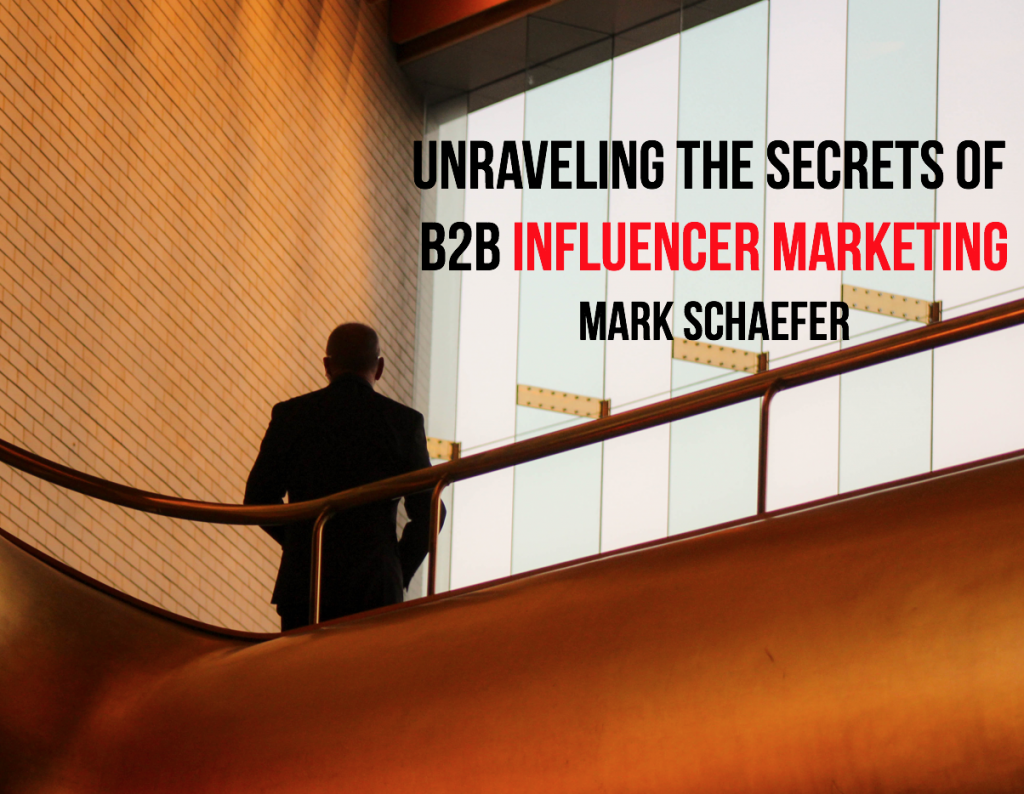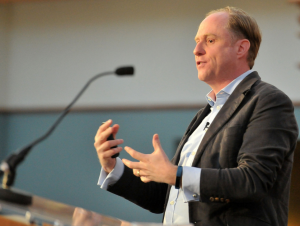
By Mark Schaefer
It seems like wherever you turn these days there is another mention, post or case study about influencer marketing. Without question this is a real and important trend but it’s really just starting to creep into the B2B space.
I recently had a chance to catch up with Andrew Grill, global managing partner at IBM, to discuss the special considerations of influence and the B2B sales cycle. Andrew was a pioneer in the field of influence marketing and was instrumental in helping to develop and commercialize one of the early measurement programs, Kred. He’s still at the forefront of influence marketing thought leadership, as you’ll see from this interview.
Mark: What’s the difference trying to use influencer marketing in a B2B technology environment compared to B2C?
Andrew: With B2C, you know your target, but you want to influence a consumer to make a purchase. I think it’s a lot harder in B2B, because the person you’re influencing isn’t always the buyer. Often the people you need to get to are not the CEO, or even the people in purchasing. There are other gatekeepers in a complex purchasing decision.
In B2B you need to spread the net a bit wider, keep the networks alive, keep the content flowing, and the chances are more likely that someone who influences a decision maker will see my content. I think the indirect nature of who you’re targeting is sometimes overlooked and it means the content has to be consumable by someone who isn’t necessarily the buyer, but is the influence-ee.
The influence-ee! I like that. So, if you’re selling a B2B product like software, what’s the process of matching an influencer with a particular marketing goal?

Andrew Grill
I think the influencer that you’re targeting has to be known for using the product organically. I think even in B2B marketing, you can sniff a paid influence from a mile off, and if someone has never talked about the product before and all of a sudden he’s singing its praises, then I smell a rat.
I think that in consumer influence, we can pay a celebrity or an Instagram influencer a lot of money to talk about a product and that may get us reach. I think in B2B we don’t need reach, we need relevance, and we need respectability, and reliability.
In the B2B space we’re probably dealing with a reasonably large purchase and it’s a purchase that isn’t going to happen every week, it may even be cyclical. So, you have to really rely on that influencer’s recommendation.
If you then look at influence around products in B2B that are not software and they are things like consulting, it becomes even more important that you’re recommending something that’s respectable or a personal product or service.
The right influencer has got to be someone, I think, who has some connection to the product.
How do you balance the fact that you need to sell something with the influencer’s need to maintain trust? Or, another way to put this, the brand is focused on promotion and influencer has a purpose. How do those goals coexist?
I think the influencer has their brand, but that goes at risk every time they put their name out there. So, if an influencer becomes a celebrity and endorses anything that moves for money, the smart influencers are going to say, ‘what’s going to damage my brand’? Because if I’m just like a celebrity that we know will do anything for money, my personal brand won’t last very long.
I think the smart influencers out there expect a fair value exchange. While they’re not compelled to do exactly what the brand wants them to do, there is a quid pro quo. For example, if the brand has given them exclusive access to content, they’re treating them like a journalist, and they’ve giving them access to content that money can’t buy, they know that’s going to increase their own influence, because their fans, their followers, their community will say, ‘wow, that person seems to get access to all this great stuff, we should keep following them, because they are really connected to this part of the industry.’
In return, the blogger or influencer knows that the end goal is about selling stuff. At the same time though, the influencer can’t be seen to just promote anything because that will tarnish their brand or reduce their brand value.
I think brands need to think about an affiliate sales model. Instead of giving a thousand dollars, I give you a hundred dollars, and I give you 100 dollars for every widget that we sell. That’s going to influence me to act in the right way and make sure it’s promoted rather than taking the money and running. Why not put the influencer on commission in a way that will actually influence their behavior? Otherwise, they just become a celebrity, please write me a check, I’ll wear your stuff, but if no one buys a widget, tough. I think they need to be part of the sales process.
Influencers should be accountable and the only way to do that to put some of their compensation at risk, just as we do for salespeople.
Brands have been conditioned to establish this highly controlled brand voice, but what does it take for a company, culturally, to begin to give up control to whatever might be on the mind of the influencer that day?
I think influence marketing is developing in waves. You and I have seen this trend from the start — people spending all day on a keyboard to raise their Klout score. I think we are starting to get past those days. But now we think that anybody with reach (a large audience) has influence.
I think brands will soon realize that doesn’t work either.
Where we need to get to is a real value exchange and brands have to be brave to allow that to happen. A good way to practice this is with their own internal influencers. Many brands already have a bunch of influencers they pay and they’re called employees! We forget that we already have influencers that are on the payroll, but then you let them have some freedom.
So, why shouldn’t brands have some other influencers as internal people? Clearly they’re going to say the right things about the company, and they can practice having a bit of brand flexibility there. And they can learn from that before signing up people who have no allegiance to the company. Too many start with external people, go through an agency, pay them a truckload of money to a known B2B influencer and hope that he or she will say the right thing.
Historically, marketers think in terms of campaigns that come and go year to year. But to do influence marketing well, it can’t blink on and off. How do you explain to an organization that an influence campaign is always on? How do you structurally manage something like that over the long haul?
It’s really easy. You equate influencers to the press.
You don’t ignore the press when you’re not running a campaign. We expect that they could be contacting us at any moment. We have to be on our toes. We have to have our representatives and our people who are authorized to speak available 24/7. So, when you start treating influencers like the press, you invite them to the same events, you give them the same embargoed material and they respect that. It then becomes an evolving relationship.
You simply have to treat these influencers with respect and nurture a long-term relationship. I’m not going to deliver you a crop of influencers by Friday, and maybe not even in the next three months. You need to put this on the same footing as the press and investor relations. This is the third external leg.
So, in an organization, something like press relations or investor relations would belong in the PR department. Is that where influencer relations belongs as well? Can you out source influencer relations to an agency?
I think if it’s a true influencer campaign, and you want to have these people as long-term advocates for your organization, you need to expose them to the internal workings of the company. That may sit with the PR team, but I would want them exposed to my R&D, my product people, I would want to leverage them for new ideas and ideation, I’d want to be able to feature them at customer events. So, I think there needs to be a single point of contact but ultimately such a close relationship that they all but join the company. I don’t believe you want to out-source something like that. I think that is dangerous.
I don’t understand why a company would ever outsource a long-term relationship. I think you have to bring it in-house.
Correct. Influencers are a new corporate asset but I’m not sure many people see it that way yet. I think brands have a real problem understanding what to do with them, because they don’t work for us, but we’re paying them, and how do we manage them? We can’t. How do we stop them from saying dumb things? We can’t. But if that value exchange is real and fair, the company and the influencer will keep each other honest.
What are the special considerations to measuring influence marketing in the B2B world?
The ultimate measurement is sales. It doesn’t matter if you’re running a marketing campaign or an ad campaign or an influencer campaign, it has to move the needle. Now, how do you measure the effectiveness of that? It’s very hard to look at how an influencer writing a blog post sells more stuff. So, as I said before, we need to look in some way to the affiliate model, so you know that their action can be tied back to an action in the marketing automation system.
Measurement becomes harder and harder to determine based on the size or the scale of the product and the long lead times and the complexity of the buyer journey in B2B. And we can’t dismiss the importance of awareness. You can reach a lot of people quickly with great content, a viral video, and an engaged audience. But I come back to, have you sold more widgets? We have to value these activities like we would measure other activities of the firm. We can’t merely settle for mentions or followers.
 Mark Schaefer is the chief blogger for this site, executive director of Schaefer Marketing Solutions, and the author of several best-selling digital marketing books. He is an acclaimed keynote speaker, college educator, and business consultant. The Marketing Companion podcast is among the top business podcasts in the world. Contact Mark to have him speak to your company event or conference soon.
Mark Schaefer is the chief blogger for this site, executive director of Schaefer Marketing Solutions, and the author of several best-selling digital marketing books. He is an acclaimed keynote speaker, college educator, and business consultant. The Marketing Companion podcast is among the top business podcasts in the world. Contact Mark to have him speak to your company event or conference soon.
The post Unraveling the secrets of B2B influencer marketing appeared first on Schaefer Marketing Solutions: We Help Businesses {grow}.
from {grow} http://feeds.feedblitz.com/~/308947776/0/markgrow~Unraveling-the-secrets-of-BB-influencer-marketing/
No comments:
Post a Comment